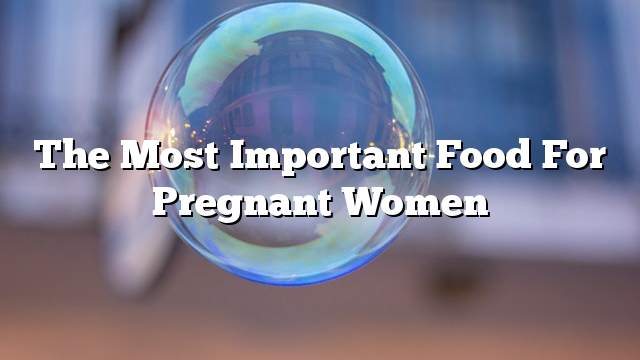In this article I will talk about these needs and the different types of foods that meet the new needs. As you may know, from the moment of conception to the moment of birth, the child’s body is formed in a womb Women grow and grow, and all these bones, muscles, blood cells, tissues and organs are formed from the food eaten by the mother, of course the material can not come from nothing, and must be available components and key elements to form and be the body of the fetus, so we expect to increase the amount of daily required for most raw materials Aiah for women, and we will start mentioning and learn about the food they contain.
Calories
It should be noted at first that the required daily calories needed by women increase after pregnancy at a rate of 15-20% more than before pregnancy. Of course, you can not increase the nutrients without increasing the calories you eat with it, in addition to the metabolic process in the body of the woman become faster and thus burn or need more calories.
Protein
Of the obvious increases in prenatal and postnatal rates is the increase in protein content, which is estimated at 25 grams as an increase over the normal daily intake before pregnancy. Pregnant women can take their daily intake of protein by eating various meats, milk and their derivatives, as well as whole grains, seeds and legumes. One or more of these foods should be taken daily to avoid a deficiency.
Fats
There is a slight increase in daily need ratios for some useful fatty acids, such as the need for omega-3 and omega-6 fats, which are found in various seeds and nuts, such as hazelnuts, almonds and sunflower seeds.
Food constituents of red blood cells
The amount of red blood cells in the body of a pregnant woman increases significantly, and this is normal because the child will need a blood cycle of its own, so women need iron, vitamin B12, zinc and folic acid, because they play a key role in the formation of new cells, so women need a large amount may not You can meet them naturally through food and here comes the role of the doctor in the description of dietary supplements of iron or vitamin B12 or others if he sees a need for it. For food, vitamin B12 is found in animal products such as chicken, meat, eggs and milk. Iron and folic acid should be taken with green leafy vegetables such as spinach or green peppers (I would like to point out that vitamin C helps absorb Iron is more likely to be absorbed so prefer the age of lemon on spinach or Molokhia, or eating orange juice rich in this vitamin with foods containing iron), and zinc and more is found in red meat and broccoli.
Food for bone building
Calcium, magnesium, vitamin D and others are present in magnesium, broccoli, earth, thistle, tomatoes and cashew nuts. Calcium is found in milk and its derivatives, in broccoli and in almonds, and there is no fear of vitamin D deficiency if women are exposed to sufficient sunlight on a daily basis.
In the end, I would like to emphasize that no dietary supplements are taken (without consulting a doctor). As there are risks and symptoms of iron deficiency or vitamins, there are also risks and symptoms of toxicity to increase in the form of tablets and supplements, replacing them with healthy, balanced food.
